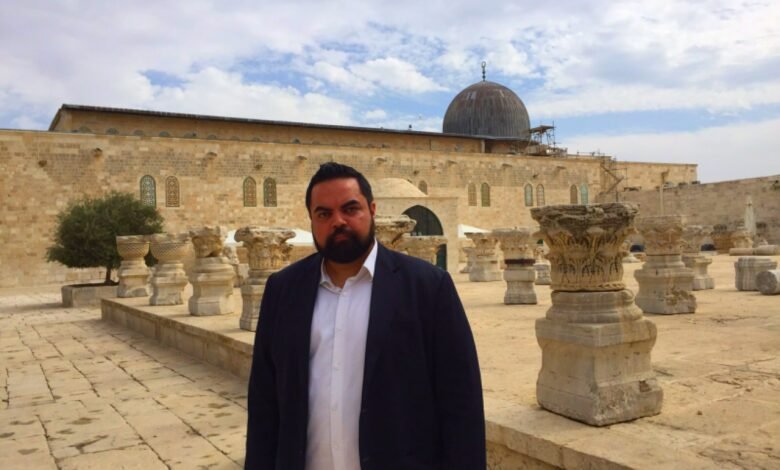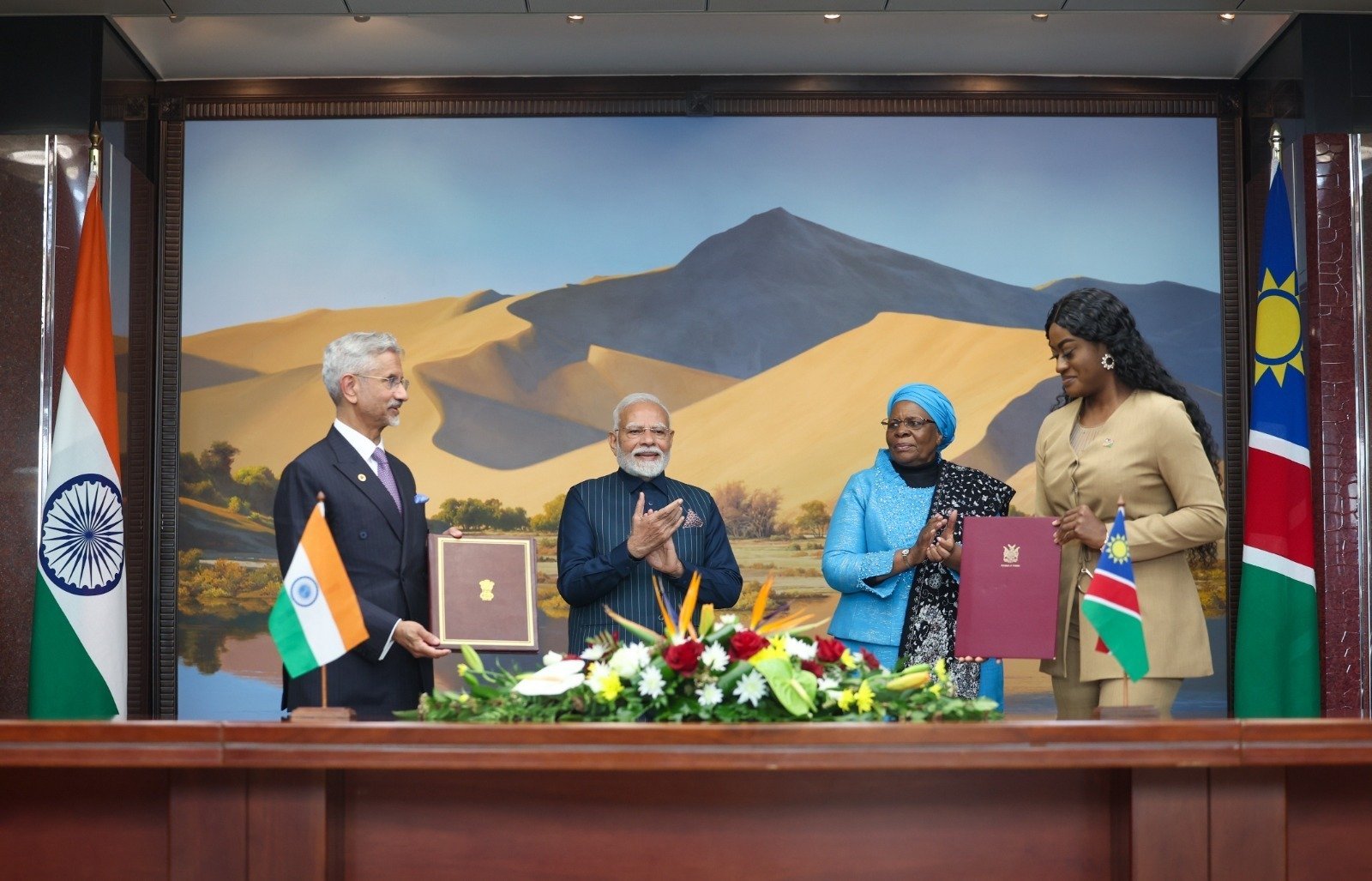
HYDERABAD (RAHNUMA) The issue surrounding Israel-Palestine conflict is often portrayed as a highly intricate web of religious, historical, and geopolitical factors, but it need not be as complicated as it is often made out to be. Two primary issues remain at the heart of this conflict – the sanctity of Haram Sharif Masjid Al Aqsa and the land dispute. In this editorial, we will examine these issues from a perspective of reason, historical context, and the potential for resolution.
The Sanctity of Haram Sharif Masjid Al Aqsa
One of the most critical aspects of this conflict is the sanctity of Haram Sharif Masjid Al Aqsa, a religious site of unparalleled importance for both Arabs and Muslims. It is essential to clarify that no Arab government or Muslim community will ever compromise on the sanctity and protection of this sacred place. Attempts by some extremist Israeli and American groups to promote the demolition of Haram Sharif, often rooted in esoteric beliefs, must be rejected by the Israeli government.
This extremist position, often linked to extremist Evangelical Christian ideals, involve a misguided hope for the Jewish State to initiate the destruction of Masjid Al Aqsa to rebuild the Temple of Solomon, followed by a belief in the return of a Messiah and the subsequent conversion or death of all Israelis to Evangelicalism, an extremist sect of Christianity. This dangerous extremist narrative is fraught with implausibility and disconnection from the reality of the situation. It is crucial for the Israelis to denounce such nonsensical and dangerous ideas.
The Hashemite Custodianship of Haram Sharif Masjid Al Aqsa and The Dome of the Rock must be respected by the Israelis and extremists must be prevented from storming the Haram and threatening to change its identity.
If concrete guarantees can be established by Israel for the protection of Al Aqsa Mosque, under the pre-existing Hashemite Custodianship of His Majesty King Abdullah II of Jordan, recognized by the Palestinian Authority, normalization of relations would allow Muslims who perform Hajj and Umrah to also visit Masjid Al Aqsa, either via the Hashemite Kingdom of Jordan’s border crossing, Tel Aviv, or a future Palestinian international airport. Such an arrangement has the potential to benefit the Israelis, Palestinian and even Jordanian economies as well as compliment further religious tourism to the Kingdom of Saudi Arabia, and thereby promote peaceful coexistence.
Recognition of BOTH Theological and Historical Perspectives
It is worth noting that the theological history of Haram Sharif Masjid Al Aqsa is significant for both Islam and Judaism. According to both Islam and Judaism’s theological accounts, the first Qibla was reconstructed by Kings David and Solomon, both Prophets mentioned in the Holy Quran as from among the Children of Israel to house the Tabut e-Sakina, or Ark of the Covenant. Judaism interprets the building of the Temple as necessary to bring forth its Messiah, while Islam like Christianity recognizes the Messiah of the ethnic indigenous community known as Israelites to be Christ Jesus of Nazareth.
While the theological history of the site is vital for context behind contention, it is crucial to recognize we live in a world of law wherein historically sound archeological evidence reigns. Hence, while these theological arguments are fine, the undeniable fact remains that Arab and Muslim rulers have safeguarded and constructed the Haram Sharif Al Aqsa for the past 1400 years, supported by established historic and undeniable archeological evidence, but did so all the while recognizing as historical fact based on theology, the site as previously constructed after the Flood of Noah, by the Israelite Prophets Kings David and Solomon from amongst the Children of Israel, and while recognizing the site as the first Qibla still, before the Arab conquest. This further strengthens common rights of both the Arabs who restored the site 1400 years ago to worship at it, but also establishes the Israelite claim to right to worship in peace at it as legitimate as well because of Islam’s recognition of David and Solomon’s connection to the site.
A Call for Equal Inheritance
The above facts then leave us in an even greater state of confusion regarding the Haram Sharif, and that is the idea behind the proposal to end the conflict by referring it back to the common source of origin of both the Arabs and Israelis – Abraham, irrespective of whom the spiritual Covenant of Abraham is believed to have been fulfilled in.
In this context, both groups must first recognize one another as legitimately descended from a common ancestor – Abraham. This was shockingly acknowledged by Israeli Prime Minister Netanyahu at the United Nations last month. During his address to the UN, Netanyahu said of the prospects of Israel’s normalization with Saudi Arabia and the Muslim world, “Such a peace will go a long way to ending the Arab-Israeli conflict. It will encourage other Arab states to normalize relations with Israel. It will enhance the prospects of peace with the Palestinians. It will encourage a broader reconciliation between Judaism and Islam, between Jerusalem and Mecca, between the descendants of Isaac and the descendants of Ishmael. All these are tremendous blessings.”
Hence for the people of Hyderabad at least, who abide by the Constitution of India and our legal system, the second step toward peace and recognition of rights based on law, then needs to be recognition of first the existence of a historic figure by the name of Abraham, and then understanding the current on going conflict between Palestinian Arabs and Israelis as not more than a civil dispute between Abraham’s two legal heirs – Ishmael and Isaac, represented by their descendants.
The Jewish Law of Succession in India is incorporated in the Indian Succession Act of 1925. Before the commencement of the Act in 1865, the Jewish community was governed by the English rules of succession.
Section 37-40 caters to the rules relating to devolution of property when it comes to lineal descendants. The following situations may arise. “If the children (lineal descendants in the first degree) survive the deceased:” “If the deceased dies without a wife/husband, the whole of the estate devolves upon the children in equal shares or devolves as a whole upon an only child. If a wife/husband and children survive the deceased, the wife/husband inherits one third and the children inherit two thirds in equal shares or it devolves as a whole upon an only child.” “If grandchildren (lineal descendants in the second degree) survive the deceased:” ”If only grandchildren survive the deceased, they inherit the whole of the estate in equal shares.” “If only great-grandchildren and remote lineal descendants (lineal descendants in the third and more remote degrees) survive deceased:” “The rule is that the nearer excludes the more remote, and that the descendants in the same degree inherit equally.”
Likewise, under Mohammedan Law – Shariat Act 1937 of India, distribution of property can be made in two ways per capita or per strip distribution. The per capita distribution method is majorly used in the Hanafi law. According to this method, the estate left over by the ancestor gets equally distributed among the legal heirs. Therefore, the share of each person depends on the number of heirs. The per strip distribution method is also recognized in the Shia Jafari law. According to this method of property inheritance, the property gets distributed among the heirs according to the strip they belong to. Hence the quantum of their inheritance also depends upon the branch and the number of persons that belong to the branch.
Hence, according to both Jewish Personal Law of India, as well as Muhammadan Law, both Ishmael and Isaac were entitled to an equal share of Abraham’s material legacy.
It is noteworthy that neglect of this principle is also at the root of the Sunni and Shia schism in Islam, wherein the legal heiress of the Prophet was kept out of the election at Saqifah, despite her claiming to be his legal heir, supported by her husband and two sons as witnesses.
The law of both groups in fact recognizes both ancestors – Ishmael and Isaac, as being heirs to an equal share of Abraham’s estate and if we assume the Haram Sharif to be the undisputed estate of Abraham, we are compelled by law, both Muhammadan and Jewish, in Hyderabad India at least, and in theory, to recognize its access for worship of the God of Abraham should be divided equally between the representatives of his two legal heirs. The Palestinian Authority represented by the Hashemite Custodianship of His Majesty King Abdullah II represents then the legal heirs of Ishmael, while the State of Israel represented by its government represents the legal heirs of Isaac, and if the law is to be followed, then both parties are to have equal access to what they both recognize as Abraham’s legacy in East Jerusalem, without desecration of the undeniable history and archeology of the site maintained by Arabs, through their custodianship.
The Land Dispute
The second major issue revolves around the land dispute. Israel’s actions have been frequently criticized for violating international law, often with impunity, due to the United States’ veto power at the United Nations General Assembly. Removing this veto power from the United States would enable the international community to address the land dispute based on evidence and international law.
Israel has faced state-sponsored terrorism against its citizens and campaigns of hate that discriminate against them based on their ethnicity primarily due to its land dispute with the Palestinians, whom the international community recognizes as an occupied people.
Hence, unless Israel bifurcates its religious claims from its ground zero reality with the Palestinians, whom the world recognizes as indigenous people of the land, along with the Israelites who returned later, but were also there during the period of Abraham, Ishmael, Isaac and Jacob, they will continue to face global discrimination and the endless cycle of violence will continue for another eighty years or more.
The only trajectory to peace from this conflict compels both towards justice for the indigenous descendants of Ishmael and also Isaac, both of whom lived in that country before it was called Israel or Palestine.








